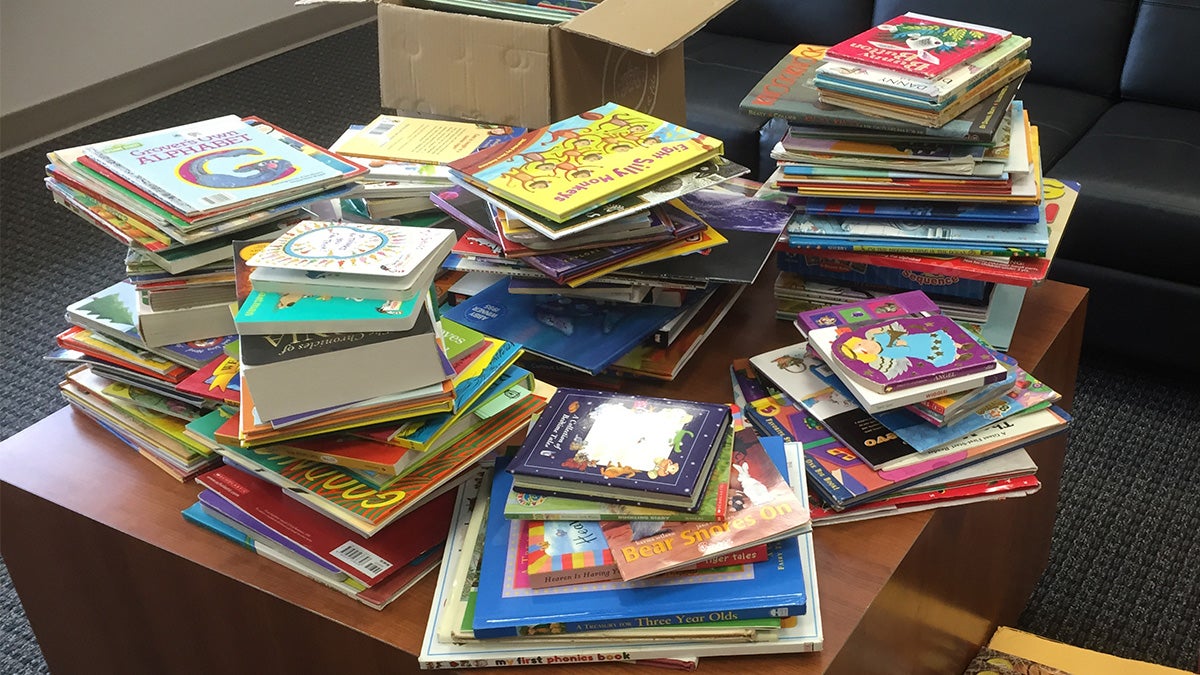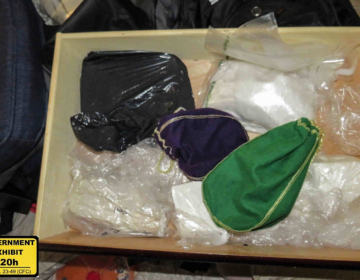Delaware book drive gives hope to incarcerated parents and their families

Hope Commission, an organization that helps incarcerated individuals return to society, received hundreds of books to donate to incarcerated parents and their children. (Zoe Read/WHYY)
Eugene Pennewell of Wilmington was first incarcerated at age 19 on charges of marijuana possession with intent to distribute.
Now at 25 he faces the limitations of probation—all while being the father of his 2-year-old daughter Laela.
Dennewell has missed crucial time with his daughter. He said due to his curfew he has less time to spend with his daughter, can’t take her to the park for more than 20 minutes at a time and she still hasn’t met her grandmother who lives out of state.
“I cherish every second because I can’t be there for a long period,” Pennewell said.
But now he will be able to bond with Laela through the donation of children’s books.
The Hope Commission, an organization dedicated to helping incarcerated individuals reintegrate into the community, has started a book drive to help children and their incarcerated parents reconnect, and also encourage incarcerated individuals to reconnect with the community upon release.
“It gives me more activities for me to do that involves being able to stay in the house. I don’t have too many things to do in the house—other than crawling around with her,” Pennewell said.
“Reading is a major impact, and she’s still young so her mind is like a sponge, and it gives me more time with her in the house.”
Over the past couple months, the Hope Commission has received about 500 books donated by several members of the community, schools and churches.
“Often we seen these individuals as statistics, and it’s important to understand they have families and want to make meaningful connections to those families, and they want to make meaningful contributions to the community. But they face extreme barriers—some of which were their own self doing, and others were made by institutions,” said Charles Madden, executive director of Hope Commission.
“(We want to) help support them, overcome their barriers and advocate with institutions to make sure these guys have a fair chance when they return to the community.”
The book drive helps the children of incarcerated parents overcome some of the challenges they face. Children of parents who are incarcerated for a year or more often don’t know their parents very well, and can affect them in many ways, Madden said.
“They don’t have a strong connection with their parent,” he said. “We know that it plays itself out with disciplinary issues at school, we know kids who have an incarcerated parent are highly likely to be incarcerated themselves, so there are lots of affects both emotional and long term on our kids.”
Activists and local and state politicians joined the book drive celebration on Wednesday in Wilmington, and discussed ways in which Delaware is trying to improve the justice system in the state.
Some of these solutions include bills that aim to eliminate overly harsh sentences and injustices in jails and prisons, and programs that help incarcerated individuals reintegrate into the community, such as halfway houses.
Delaware correction facilities have about a 66 percent recidivism rate, and about two thirds of inmates return within three years, according to Attorney General Matt Denn. He said he would like more funding in the State budget to be allocated to community based reentry programs.
“Programs like this are important because this is what gets those numbers down, and this is what gets better outcomes for people who are getting released from our correctional facilities,” Denn said.
“It’s important for the men and women getting released, but also important for the larger community because they’re going to be on the receiving end of crime if we don’t deal with the recidivism problem.”
Madden said he appreciates the show of support from the general community and its leaders, and hopes the event will help his clients make connections with the community in the future.
“Some of these professionals can take some of the guys away and show them some of the things they’ve done as parents and some of the things they do as professionals, so there’s an opportunity to make connections beyond the book drive that will help the families the guys are returning to,” he said.
Pennewell, a lover of reading himself (particularly of history books), said he looks forward to reading to Laela. In the future he would like to be a chef for a fine cuisine restaurant.
“I was always positive even before she was here, but since she was born it’s my incentive to give her what I never had, and I want to be to her what I was always looked for as a kid,” Pennewell said.
WHYY is your source for fact-based, in-depth journalism and information. As a nonprofit organization, we rely on financial support from readers like you. Please give today.





